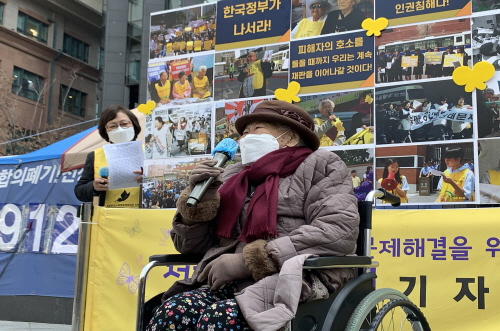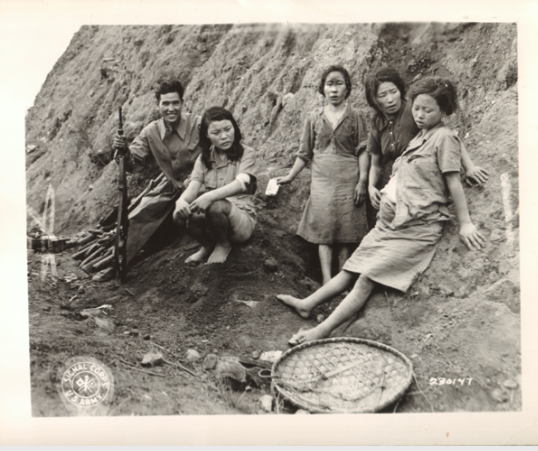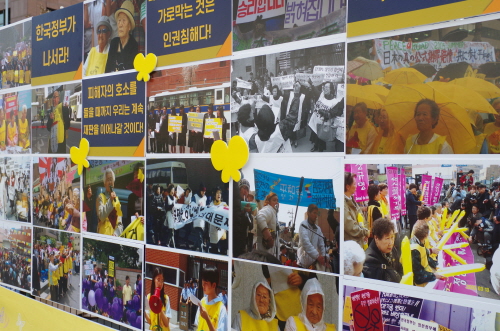Just before noon on March 24, a van carrying a 94-year-old woman rolled into Jongno, a northern Seoul neighborhood where tidy high-rise office buildings meet historic landmarks. She was sitting in the back seat and her eyes lit up when a young activist opened the van door. The elderly woman extended her left hand before she was reminded that they could hold hands only after disinfecting.
She had been cooped up in her nursing home for about a year due to COVID-19. The virus threatened to take away her motivation in life: to tell her story until justice is served.
But she did not lose her motivation. A worker from the woman’s nursing home pushed her wheelchair to the center of a group of around 20 people — far fewer than would have been there if no COVID restrictions were in place. She was handed a microphone, but the elderly woman’s thin hands could barely hold on to it.
Moments of silence passed as she gathered her thoughts. “Halmoni, why don’t you start with your usual opening?” whispered the man who pushed her wheelchair, using the Korean word for “Grandma.” “Your usual, ‘Hello, I’m survivor Lee Ok-sun.’”
Lee, 94, was kidnapped and forced into sexual enslavement by the Japanese military during World War II. She was 16 years old. She has testified repeatedly about the atrocity since she broke her silence more than two decades ago.
“They hit the young girls and I when we refused,” Lee said at this weekly protest that seeks justice for survivors of Japanese military sexual slavery. When she resisted, Japanese soldiers slit her dress, cutting her as well, she told the group, her shaky voice rising. Blood ran down her abdomen. But that didn’t stop them from raping her, she said, her voice breaking. “If they didn’t take us against our will, why were we taken away by force?”

Lee has asked that question over and over again in Korea and around the world, seeking an apology from her perpetrators. For years, she has joined other survivors, activists and supporters who have been gathering outside the Japanese Embassy in northern Seoul every Wednesday at noon since January 1992.
The protest — formally called the Wednesday Demonstration — started when former Japanese Prime Minister Kiichi Miyazawa visited Korea, a few months after the first Korean survivor broke her silence. July 15th will mark the 1,500th day of protest, which in its nearly three decades, has been cancelled just once, to respect Japan’s 1995 Kobe earthquake.
Lee’s jaw was fractured when she was held prisoner, so she has difficulty speaking clearly. Her vision, hearing and legs were impaired,too. She is opposed to the term “comfort women” or “comfort station,” which was coined by Japanese occupiers of Korea. She calls the place she was held a “death room.”
Like other survivors, Lee is fighting on behalf of those who died without seeing justice. On their death beds, some of them used their final words to continue the push for what they call a sincere apology in which the Japanese government would admit its past wrongdoing and apologize to the survivors. Japan’s conservative government, in power since the mid-1990s, has sought to rewrite this dark chapter of their history and recently approved high school history textbooks that have reduced or omitted the section on wartime sexual enslavement.
The country’s far-right nationalists have claimed that the survivors chose to work as prostitutes and were not taken against their will — the greatest insult to the survivors.
Only a fraction of survivors registered with the Korean government are still alive. All of them are in their 80s and 90s. The women, who were trafficked as teenagers, bear the burden of what the U.N. Commission on Human Rights has called “a crime against humanity, a gross violation of international humanitarian law, a crime against peace and a crime of slavery, trafficking in persons and of forced prostitution.”
The summer of 1942 was merciless when Korea recorded its second hottest heat wave to date. One day that July, Lee was on her way back home after running an errand in Ulsan, a city in southern Korea, according to testimony she gave in 2004 to the Seoul-based advocacy group Korean Council, whose mission is to bring justice to the survivors and prevent wartime sexual violence. Lee, then age 16, noticed a truck parked near her house. Two male strangers from the truck snatched her.
“Let me go,” she recalled screaming.
She fought with all her energy, she said, but they overpowered her. That night Lee and other young girls boarded a train bound for a “death room” in occupied China, she said. She would spend the next three years there as a sex slave.
Like Lee, as many as 200,000 girls were forced to do household chores and take care of injured soldiers by day, and then to sexually service soldiers at night. On Sundays, the busiest day of the week, Lee has said she would see around 50 soldiers.

Tokyo’s stance was not always one of denial. In 1991, late survivor Kim Hak-sun became the first to break her silence about the sexual slavery — and within three months, the weekly protests began. Japan responded by launching a study. Two years later, former Japanese Chief Cabinet Secretary Yohei Kono issued a statement about the study’s findings, admitting Japan’s war crime.
That willingness to make at least a partial admission began to take a turn in the mid-1990s, when former Prime Minister Shinzo Abe first came to power, propelled by a far-right base.
Lee is one of the few surviving victims who speak publicly.
“Halmoni believes getting a sincere apology is her life purpose,” said Kim Dae-wol, chief curator at the House of Sharing, the nursing home for survivors where Lee lives.
Most of the survivors who appeared with her at previous Wednesday Demonstrations have died. Already two survivors have passed away this year. Only 14 known surviving victims remain in Korea.
Academics, documentarians and activists in Korea, Japan, the U.S. and around the globe are working on setting the record straight. Their efforts have been met with strong pushback from Japan’s far-right base and sometimes face lawsuits from nationalists.
“Their [far-right nationalists] aim is to create a myth of a peaceful imperial Japan that didn’t commit war crimes,” said Miki Dezaki, the Japanese-American film director. Nationalists who were interviewed in Dezaki’s documentary Shusenjo – The Main Battleground of the Comfort Women Issue have sued him for defamation and deception, among other accusations. The aim of their historical revisionism is to entice youth to join the military, ultimately to restore Japan’s military power, Dezaki said.
The end of World War II brought an end to Japan’s 35-year-long colonial rule of Korea. Lee stayed in China after the war. She did not have the resources to return home, she said. Shame also held her back.
Most survivors who returned home kept silent about their experiences, even to their families. Many who shared their past were shunned by their families and communities. The number of Koreans who have registered as survivors with the Korean government reflects the oppressive social norm. A total of 240 women have registered, about one-thousandth the estimated number of girls who were trafficked, according to Korea’s Ministry of Gender Equality and Family.
In 2015, without consulting the survivors, Tokyo and Seoul reached an agreement on the issue of sexual slavery. The deal included a $9 million fund, a portion of which was distributed to 35 survivors, The Japanese government maintains that it settled the issue with this 2015 agreement and a 1965 treaty that normalized diplomatic relations between Seoul and Tokyo. Survivors have criticized the 2015 agreement because the Japanese government failed to fully recognize the systematic war crime and apologize. The Korean government has stood by the deal.
Survivors, including Lee, are pleading with the South Korean government to take the matter to the International Court of Justice for resolution. The government has not complied with their request, saying it would “carefully review” the case. If their request were to be accepted, it would be the first time the atrocity was presented at the court.

Cases brought by survivors have moved through Korea’s justice system, and in January, in the first ruling of its kind, a Seoul court ordered the Japanese government to compensate for damages. Yet after the ruling, Lee expressed frustration that “nothing has been resolved properly,” according to Korean newspaper JoongAng Ilbo. “I’m not happy,” she said. “Japan must apologize sincerely. Money won’t do.”
Financial compensation is not a priority for Lee, whose life was upended the day she was trafficked into sexual enslavement, she said. Lee returned to Korea in her early 70s through a Korean television show that connected Korean survivors in China with their families. Her family had registered her as a dead person. With the help of advocates, she regained her citizenship.
Lee became a Catholic in China, and she starts each day with a televised Mass at 9 a.m. while dipping her feet in warm water.
She thought her experience as a sex slave made her ineligible to attend Mass until a nun in her village in China persuaded her that she didn’t do anything wrong and could participate. She hasn’t missed a daily Mass since.
Lee believes God will be at her side until the day Japan makes a sincere and official apology and takes legal responsibility.
It is that belief that led her to testify once again at the 1,484th weekly protest this March. Behind her were yellow butterflies that symbolize the hope that survivors will achieve justice and become free at last from the past.
“The Japanese government is neither reflecting on themselves nor speaking the truth,” she said at the protest, her voice breaking as she shook her left arm back and forth in disbelief. “Everyone, what can we do for a sincere apology?”
A note on the reporting of this story:
Lisa Kim, a former reporter in Seoul, watched hours of live streamed Wednesday Demonstrations, including the March 24 event in which Lee spoke. She reviewed transcripts and recordings of survivors’ testimonies and interviewed experts and nonprofit organizations that have worked with survivors. She also interviewed the nursing home worker who helped Lee out of the car and whispered in her ear at the rally.
About the author(s)
Lisa Kim is a multi-platform journalist pursuing her master’s degree in data journalism at Columbia University Graduate School of Journalism. She previously worked as a reporter at an English-daily, The Korea Herald, and as a weathercaster at Arirang TV, an international TV network. She holds a bachelor’s degree in economics from Yonsei University. When she’s not sun basking, you could probably find her going down rabbit holes learning new subjects or looking into stories.
Twitter: BKNews
Github: BKNews
Email: bk2776@columbia.edu



